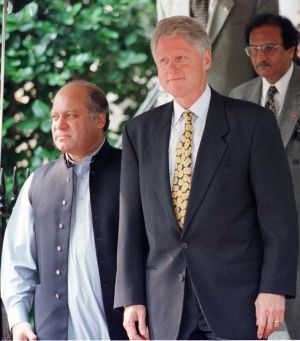 The United States of America sought Pakistan's help in 1998 to prevent Osama bin Laden from launching an Al Qaeda attack against it, with then President Bill Clinton asking Prime Minister Nawaz Sharif to personally use his influence to prevail over the Taliban in averting the imminent strike.
The United States of America sought Pakistan's help in 1998 to prevent Osama bin Laden from launching an Al Qaeda attack against it, with then President Bill Clinton asking Prime Minister Nawaz Sharif to personally use his influence to prevail over the Taliban in averting the imminent strike.
Clinton called up Sharif from his Oval Office and asked for his personal help after an intelligence input about an imminent Al Qaeda attack, according to the declassified memorandum of the telephonic conversation made available by the Clinton Presidential Library in Little Rock, Arkansas.
Sharif told Clinton that the Taliban are "very stubborn" and "very uncooperative", according to the document.
Clinton sought Sharif's help in prevailing over the Taliban to prevent Osama bin Laden from an imminent Al Qaeda attack against American targets and bring him to justice.
"I need your personal help," Clinton told Sharif on December 18, 1998, after he received intelligence information about the possible Al Qaeda attack.
During the telephonic conversation, which lasted for about six minutes, Clinton asked Sharif to use his relationship with the Taliban leaders, who then were the rulers of Afghanistan, to bring bin Laden to justice.
"I understand your anxiety and your position, Mr President. You know, I told you in Washington that the Taliban are very stubborn and very uncooperative people," Sharif told Clinton, according to the document.
Referring to his previous conversation with Clinton and also with the Saudi Prince Turki in this regard about bringing bin Laden to justice, Sharif had said the Taliban are very stubborn on this issue and that they are unlikely to listen to him.
"I told you what transpired between us and Taliban and so Saudi Prince Turki, who came especially from Saudi Arabia on that particular issue, and they were very stubborn. We will do everything we can, I assure you," Sharif had said, according to the declassified document running into three pages.
"I will send my people tomorrow to Afghanistan to meet with them and discuss this with them, and tell them this will not be in their interest and it will serve no purpose, that it will invite retaliation and a world reaction. I will do whatever I can, I can assure you of that, but you must understand they are very stubborn and uncooperative," Sharif is quoted as saying to Clinton.
Nearly 15 years after that call, when Barack Obama sits down with Sharif at the White House on October 23, the US president, it looks like, would also seek his help this time to bring the Taliban on the negotiations table for the reconciliation process so as to bring lasting peace in Afghanistan.
This time again, it might take a while, if not years, for journalists to figure out what Sharif's response was.
Clinton, in his call to Sharif, had said, "I understand, but there's a difference between being uncooperative and not giving him up, and being uncooperative and allowing him to conduct operations. Those are fundamentally different things. I hope you can bring that home to them."
"I have (tried) and I will (try). They (Taliban) don't listen to us all the time. I'm very disappointed with their attitude," Sharif, the then prime minister of Pakistan told the then US president.
"We have reliable intelligence, and quite a lot of it, that Osama bin Laden intends to strike a US target very soon, perhaps in 48 hours, and that the operations -- there may be two of them -- are being orchestrated by bin Laden from within Afghanistan," Clinton had told Sharif.
"Now, all I can tell you is this is not in reaction to Iraq; he's been working on this. I think it is imperative the Taliban do everything it can to bring him to justice. I think Pakistan has a lot at stake in the Taliban being accepted in the international community, and if this (attack) happens it will become virtually impossible," Clinton said.
"We have warned the Taliban repeatedly that we will hold them responsible, and we will warn them again. I want to ask you to do whatever you can to stop this immediately. I cannot overstate the importance or urgency of it. He has this cooking in the next several days here," Clinton had said.
"We are talking to the Saudis again about it. Anyway, I wanted to tell you I am very, very worried about it and the consequences if it occurs," he said.
Image: Former US President Bill Clinton and Pakistani Prime Minister Nawaz Sharif walk down the steps outside Blair House following their talks in July, 1999.
Photograph: Reuters











 © 2025
© 2025